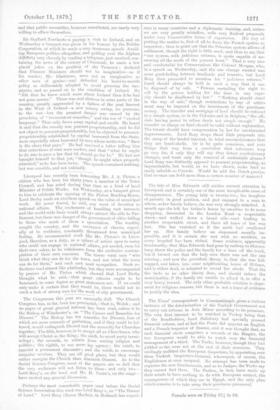Sir Stafford Northcote is paying a visit to Ireland, and
ou Wednesday a banquet was given in his honour by the Dublin Corporation, at which he made a very dexterous speech. Avoid- ing European politics altogether, and getting over the Afghan difficulty very cleverly by reading a telegram, just received, con- taining the news of the victory of Charasiab, ho made a few placid jokes cn the position of the Treasury ; declared that Finance Ministers should not be imaginative—as if his master, Mr. Gladstone, were not as imaginative as other men of genius—and defended his hand-to-mouth policy as deliberately adopted to avoid pressing the tax- payers, and so passed on to the condition of Ireland. He "felt that he knew much more about Ireland than it he had not gone across." There was real distress in some parts of the country, greatly aggravated by a failure of the peat harvest in the West of Ireland—a new misery owing, we presume, to the wet—but the greatest danger was caused by the preaching of " inconsistent remedies," and the use of " excited language." That only drove away capital and credit. He heard it said that the remedy was peasant-proprietorship, and he did not object to peasant-proprietorship, but he objected to peasant- proprietorship established by capital borrowed from the State, more especially when borrowed by men whose motto was, " Base is the slave that pays." He bad received a letter tolling him that reductions of rent were useless, and that "what ho ought to do was to pass a law that 6d, should go for ls." He had not brought himself to that yet, "though he might wheu properly educated," as he has been twice. The speech contained nothing, but was sensible, and not unkindly.
































 Previous page
Previous page